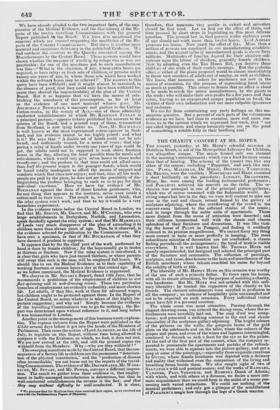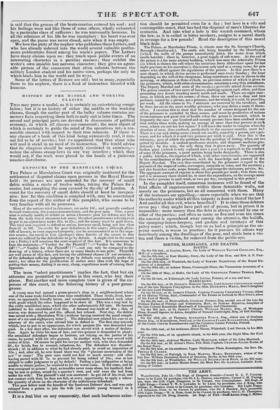THE CHARITY CONCERT AT MR. HOPE'S.
THE concert, yesterday. at Mr. HOPE'S splendid mansion in Dutchess Street, in aid of the Metropolitan Infirmary for Children, was altogether unique. The music formed only one element in the morning's entertainment; which was a feast for more senses than that of hearing. The scheme of the concert was like any other of the season ; including " Pappataci," and such like rari- ties. PASTA, MALIBKAN, DE MERIC, DONZELLI, TAMBURINT, DE BEGNIS, were the vocalists ; MOSCHELES and HERZ executed a duet brilliantly on the pianoforte; LINDLEY, DRAGONETTI, MORI, &c. were among the leading instrumental performers ; and PAGANINI achieved his marvels on the violin. The or- chestra was arranged in one of the principal picture-galleries; which was of course crammed with the fashionable world. Ar- riving somewhat late in the day, we were well content to take our i ease n the cool and classic retreat formed by the gallery of sculpture adjoining, where the overflowing of the crowd in the concert-room listened to the softened strains of the music; and to range through the noble suite of apartments. Those more distant from the scene of attraction were deserted; and their stillness harmonized well with the chaste and classic splendour of their furniture and decorations. It was like visit- ing the house of PLINY in Pompeii, and finding it suddenly restored to its pristine magnificence. We cannot fancy any thing more correct in taste or more perfectly in keeping. The most subordinate minutise of decoration are not overlooked; a classic feeling pervades all the arrangements ; the hand of taste is visible everywhere. It is well known that Mr. Tnoateas HOPE not merely superintended, but designed and selected the principal part of the furniture and ornaments. The collection of paintings, sculpture, and vases, does honour to the taste and munificence of the British merchant; whose talents ennobled his name far beyond the nobility of birth or title. The liberality of Mr. HENRY HOPE on this occasion was worthy of the son of such a princely father. To throw open his house, with all its classic attractions, for the purpose of assisting a charity, was handsome. But Mr. HOPE was not satisfied with this ordi- nary liberality: he treated the supporters of the charity as his friends. The choicest refreshments were supplied in profusion te- en the company ; an instance of hospitality quite unexampled and not to be expected on such occasions. Every individual visitor must have felt it a personal courtesy.
The whole scene was most attractive. Passing through the- elegant drawing-room, you entered the dining-room, where the re- freshments were tastefully laid out, The coup d' mil was sump- tuous; and presented a striking contrast to the cool and chaste classicality of the sculpture-gallery adjoining. The bright colours of the pictures on the walls, the gorgeous lustre of the gold plate on the sideboards and on the table, where the colours of the grapes and pines, and even of the wines and liqueurs intermingled, combined to furnish as rich a feast for the eye as for the palate.
At the end of the first part of the concert, when the company se- parated to promenade the apartments and partake of the refresh- ments, we were able to squeeze into the picture-gallery, and get a peep at some of the paintings,—especially three exquisite.creations by GUIDO, where female loveliness was depicted with a delicacy- and reality that withstood even the comparison of the living and breathing forms beside them. We also caught sight of two of SALVATOR'S wild and poetical scenes • and the works of RAPHAEL, VANDYKE, PAUL VERONESE, and ituessrs's Death of Adonis; with which, and with others at a distance, we desire a more inti- mate acquaintance than we could form in the midst of a scene pos- sessing such varied attractions. We could see nothing of the- musical performers ; and only got a glimpse of the scintillations of PAGANINI'S magic bow through the legs of a Greek warrior. is said that the groans of the brute creation entered his soul : and his feelings were not like those of some others, wholly exhausted by a particular class of sufferers : he was universally humane. In the relations of his life he was exemplary : his heart was ever open, and the purse was never closed, save when it was empty. We love the piety of the nephew who publishes these Letters, and who has already ushered into the world several valuable posthu- mous publications found among his uncle's papers. The Letters have many. claims upon us : they touch upon public events of an interesting character in a peculiar manner; they exhibit the writer's own amiable but nervous character; they give an agree- able picture of the connexion that often subsists -between the solitary London student and his native town, perhaps the only tie which binds him to the world and its ways. Some of the letters of RITSON are odd ; but in many, especially those to his nephew, there is a fund of instruction blended with humour.



















 Previous page
Previous page